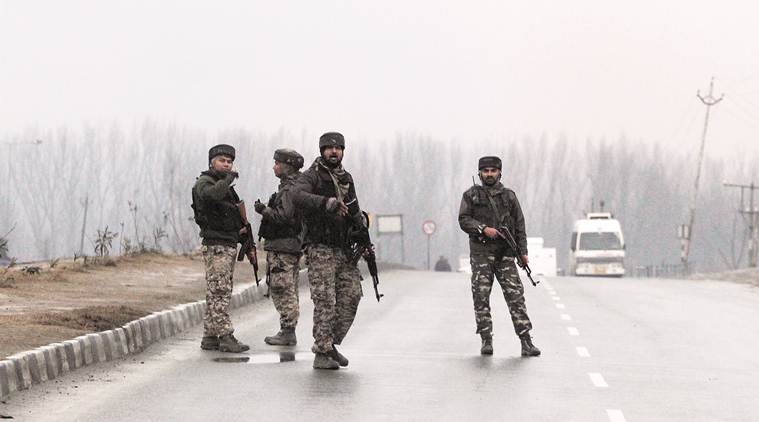Soldiering on, after Pulwama
We are acutely aware of what is at stake in Kashmir. And that there is no easy way out

Another bloody strike in Kashmir has left the nation in shock and disbelief. The 40 CRPF bravehearts who were killed in a suicide car bomb attack near Lethpura, Pulwama, on February 14, came from all corners of the country. As the nation mourned, in a predictable display of defiance, a section of Kashmiri society celebrated this strike on social media. A nasty backlash followed, that does no credit to the national cause in the Valley. Especially because patriotic Kashmiris serving in all our security forces are at the frontline in this conflict.
Across the country, the reactions from the usual suspects have been all too predictable. The jingoists go on beating their war drums, the peaceniks carry on smoking their peace pipes, and analysts educate us about the lack of a proper strategy in Kashmir. Everyone has their favourite scapegoat to blame for the mess.
Many point a finger at the current dispensation at the Centre for its hardline approach, that has supposedly worsened the situation in Kashmir. Others bemoan the lack of a coherent policy in Kashmir, as if it was some kind of a magic formula which once adopted, would solve everything. Lack of dialogue is often blamed for escalating violence. This is hogwash in a scenario when violence is the primary negotiating tactic of our enemy. Policies are not formed in a vacuum. They are, of course, based on strategic objectives, but they are also shaped by capacities and constraints. The current course in Kashmir is to no one’s satisfaction but it is imposed on us by a combination of all of the above. To paraphrase Drucker, in Kashmir, reality eats policy for breakfast.
For the security forces operating in the Valley, most of this talk is plain noise. Fact is, we are too quick to claim improvement by clutching at straws. So a decline in violence and increase in voter participation will be trumpeted as a huge achievement. And conversely, a spectacular terror strike such as the incident in Pulwama, or an increase in casualties over the previous years, is enough to bring out the prophets of doom and gloom. The truth, as always, lies somewhere in between.
There are challenges in Kashmir that are surmountable. And there are challenges in Kashmir that we have no answer to. Knowing which is which would be a useful exercise to weigh our options post Pulwama.
Let’s look at the negatives first. It is not possible to dissuade the separatists/jihadis from the path of violence. It is not possible to coercively or diplomatically change the mindset of the generals and mullahs in Pakistan who provide them with basic support. It is not possible to seal the border completely to prevent crossing of militants and weapons. It is not possible to ensure that “fidayeen” attacks and the resultant loss of life can be prevented in totality. Anyone who promises any of these as an achievable policy objective, has a tenuous grip on reality.
Conversely, we must be clear about what is achievable in Kashmir. Preserving the demographic profile and cultural distinctiveness of the Valley is no longer in our national interest. Article 370 was a goodwill gesture by Jawaharlal Nehru that no longer serves its original purpose of making Kashmiris embrace the accession to India. If we want to show national resolve, repealing it would be exhibit A. It has long outlived its utility, if it had any to begin with. All it has done is create a limitless sense of entitlement in the Valley. The second thing that is entirely achievable is to continuously dehyphenate Ladakh and Jammu from Kashmir Valley. For too long, the Valley has been given the privilege of speaking for the entire state. It doesn’t, and it is high time to show the mirror to the separatists about the culturally parochial and geographically limited nature of the Azadi movement. The right to self-determination cannot begin at the Zojila and end at the Banihal.
The third thing is to ensure that at the tactical level the security forces are given the best logistical support possible. In practical terms, it means bulletproofing and IED proofing all the vehicles used by the security forces in the Valley. It also means reimposing restrictions on civilian vehicles during convoy movement that had been in place earlier but were done away with in a goodwill gesture. And it will also require a more robust airlift capacity between Jammu and Srinagar for all the CAPFs. The fourth is to step up our efforts at deradicalisation
and engage more meaningfully with Kashmiri youth.
and engage more meaningfully with Kashmiri youth.
In the aftermath of Pulwama, our task is cut out. Our first challenge is to go after the perpetrators. As I write this, those efforts are well under way. Our second challenge is to ensure that the threat of such attacks in the future is minimised. One would want to paint a realistic picture on this count. With the best technology, equipment and intelligence at their disposal, US-led forces in Afghanistan and Iraq have not been able to eliminate the threat of car bombs. So let’s not promise something to ourselves as a nation that is impossible to deliver. We can be better prepared, that is all.
Our third challenge is to ensure that the culture of restraint and proportionate response by our men on the ground does not break down. Despite propaganda to the contrary, there is no comparison between the savagery of the separatists and the professionalism of our security forces. All of us serving in the Valley are seething right now, but our rage must be channelised productively and intelligently. This is a tragic setback, no doubt. But we have to learn its lessons and soldier on.
Despite the best efforts of the separatists and their sympathisers in our civil society to paint us as such, those of us who serve the nation in the Valley are not mindless bloodthirsty monsters. We are all proud professionals with a life beyond the uniform too. We are acutely aware of what is at stake in Kashmir. And that there is no easy way out. This attack must be seen for what it is, a cowardly act of desperation, designed to show that the jihad is alive and kicking. It makes not the slightest difference to our national resolve. We mourn our dead, console their families and gear up for the struggle ahead. Any number of Pulwama-style attacks will not change that.
The writer is an IPS officer serving in Kashmir. Views expressed are personal










.png)




























No hay comentarios:
Publicar un comentario